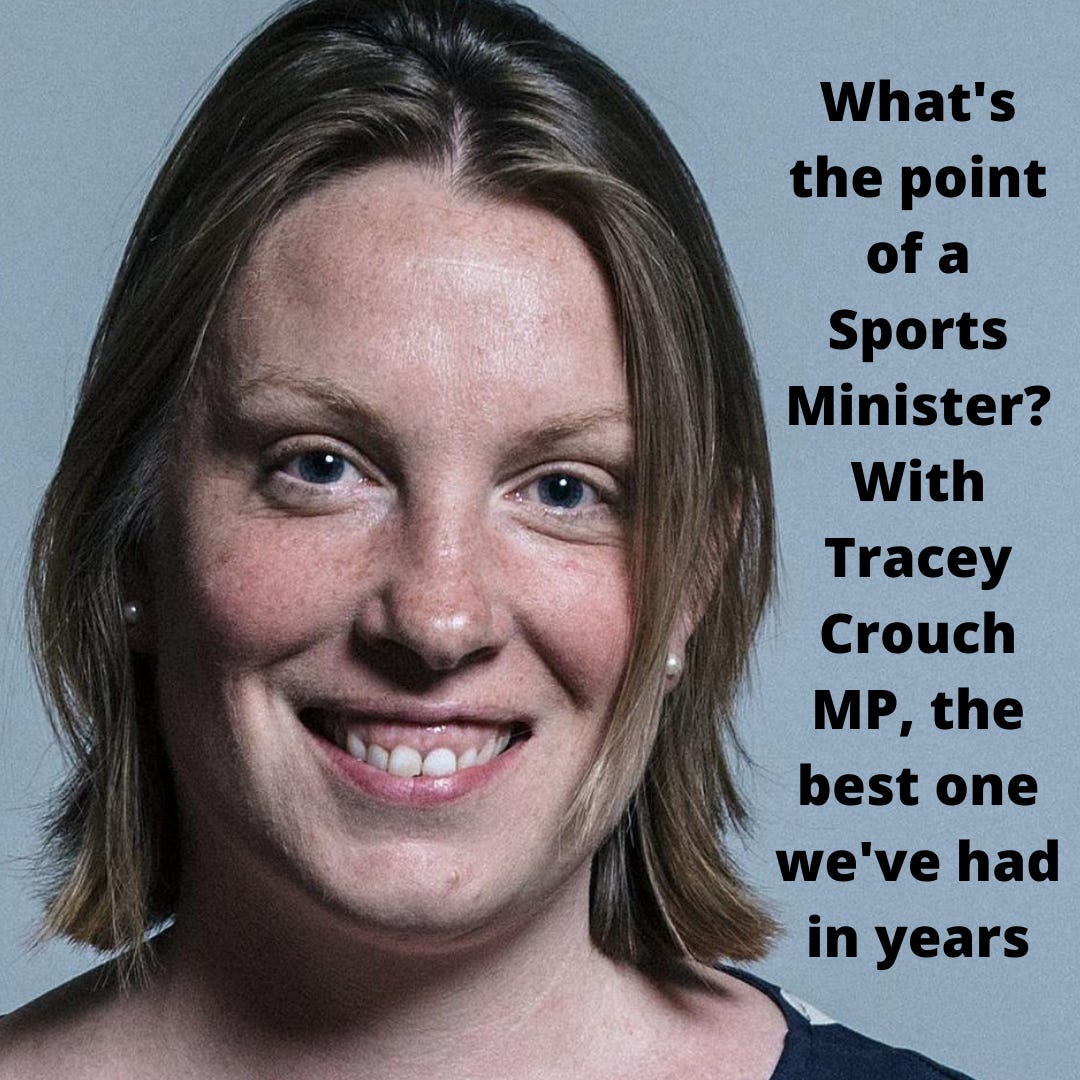Coked-up Big Eventers; Real fans v PowerPoint fans; Format wars; Hard debt v Soft debt; Amazon's price problem; What's the ROI on Influencers v Olympians; 'Where's the Olympics on?'
The newsletter of the podcast
Thousands of people subscribe to Unofficial Partner.
We publish two podcasts each week, on Tuesday and Friday.
These are deep conversations with smart people from inside and outside sport.
This newsletter is our way of picking up the threads, and is published every Thursday.
Our entire back catalogue of 180 sports business conversations are available free of charge here.
Each pod is available on Apple, Spotify, Google, Stitcher and every podcast app.
If you’re interested in collaborating with Unofficial Partner to create one-off podcasts or series, you can reach us by replying to this email.
The business of formats is the business of sport
This week’s podcast is with Omar Chauduri and Ben Marlow of Twenty First Group, and is a deep dive in to sporting formats, which is the link between performance data and the commercial value of sport.
Formats are the product.
The Hundred, The Super League, FIBA 3x3, UCL Swiss models, Premier League play-offs, The IPL, Rugby Sevens…every sport is chasing new, younger and/or geographically spread fans.
Format design is central to this. It creates demand by energising tired competitions or gives fans something new to talk and think about.
On the supply side, it allows rights holders to create investment opportunities for private money that sit outside existing structures, and which don’t come with the historical baggage.
My pet theory is that Tom Harrison’s longer term bet on The Hundred is about creating a reason to get IPL franchise owners and other rich people/organisations to buy in and bring Virat Kohli etc with them (Harrison didn’t confirm or deny this was his plan on Ep166 the podcast).
Issues arising
There are some good themes that spin off the format conversation.
Radicalism v tinkering. Much of the marketing of sport is ornamental - jazz hands presentation tricks and the Samsung Slider. Format design is fundamental.
Contrivance v authenticity. Analogous to the drugs debate: we want to know what we’re seeing is real, and that the emotion emerges from genuine sporting competition, not cheap horror film manipulation.
Levelling the playing field v punishing excellence. Dominance is boring but sport has to identify the true champions, otherwise it’s just a game show.
Shifting incentives for women’s sport. See below: why we don’t talk about the women’s Olympics and The Hundred might’ve been more radical if they’d combined the men’s and women’s points in to a single league.


Amazon, rockets and buyer psych
My view of Amazon is threefold:
1. It’s famous for making unfathomably large amounts of money.
2. It doesn’t pay enough tax.
3. The brand is almost entirely about utility.
In terms of sentiment, I owe Amazon nothing. And as soon as there’s a reason not to buy from there, I’m off.
Then you lay sport across this picture.
The initial rights story positions sport to drive up Prime subs, who then buy more stuff than the rest of the population, creating a much-lauded ‘third way’ of calculating ROI on sport.
Two things happened last week.
Jeff Bezos went on an ego trip to space and then thanked me for paying for the rocket.
Amazon announced its new price structure for Ligue 1 in France.
This feels like a good experiment in buyer psychology.
Thus far, the Amazon sports rights story has been based on: buy Prime and get the sport as a reward.
In France, that story has changed. The reward will now put you back 13 quid a month.
As we said in The Bundle, this might just be a post-MediaPro debacle thing specific to the France media market, with Amazon just responding with pragmatism to local context.
But…what if, it’s the new normal for Amazon?
It’s one thing gifting me Premier League as an add on for Prime, quite another to start charging me for it separately.
More macro, if the France decision is a signal that Amazon’s moving toward a more traditional ROI model, there’s a problem for sports rights holders.
The customer’s expected price point for a sports streamer is less than 10 quid a month. But the expectation of rights fee revenue from many sports is still based on the bundle price of over 30 quid.
The numbers don’t add up.
See also: Charlie Boss is right here:


What if, Big Eventers are also coked-up estate agents?
I was thinking about the Cult Of The Big Eventer during the first men’s game of The Hundred at the Oval last Thursday, when a plastic pint glass of 8 quid Carling flew over my head (sign of age: my initial instinct was to worry about the pound deposit to come back on that).
I don’t want to overplay it, but the atmosphere was a bit aggressively boozy, overlaid with a chino’d veneer of post-work ‘bantz’.
There are two types of crowd.
The real one and the fantasy version that exists in the PowerPoint decks of ‘SportsBizWorld’.
The difference between them was most obviously exposed at the Euro 2020 final at Wembley.
The marketing view of England fans v England fans.

An unfortunate outcome is when muggles believe the marketing version of sport. The Benetton family then has to walk over broken glass to get to Wembley, or sit politely while mum is targeted by Love Island rejects on the pull.
The flaky conclusion
Friends who attended the opening women’s game of The Hundred at the Oval report back that it was closer to the marketing idyll: more coffee and Coke than Carling and coke.
If the media numbers between men’s and women’s sport are anything like comparable - and in The Hundred they appear to be, initially at least - then it’s the men’s game which starts to look like the brand risk.
Push that comparison a stage further and I’m looking at the women’s game as the sponsor’s dream, and the mens’ game as an annoying, angry brother.
The Public v Discovery
There’s a moment when the broader impact of a TV rights deal hits the mainstream.
This week’s popular question on Twitter has been: Where’s the Olympics on?
Good thread here:

Funny how little was made of this arrangement during the last Winter Olympics, the first iteration of the Discovery deal. It’s almost as if nobody was watching.
Football finance: Hard debt v Soft debt
Deloitte’s new report says Premier League clubs’ debt rose from £3.5bn to £4bn while revenues fell for the first time, by £649m to £4.5bn.
The EFL Championship clubs’ debt rose 18% to £1.3bn.
It’s the source of the debt that’s interesting:
Arsenal and Spurs went to the Bank of England’s Covid emergency fund.
Burnley, Southampton and West Ham United used MSD Partners.
The EFL acted as broker to their clubs by going via the investment management arm of MetLife for £117m.
Then there’s the rest.
90% of clubs in the EFL get ‘soft loans’: money from their owners that don’t charge interest and have no fixed repayment schedule.
This might sound like free money. But Tracey Crouch’s review sees it a different way.
Because if the owners go bust, so do the clubs.
Go deeper: Hear Tracey Crouch MP on UP #47, via the archive.
Fun fact, that was the last face to face podcast recording we did before lockdown.
Paragraph of the Week
John Branch in the New York Times:
“We hope America still loves us,” Biles said.
Hidden in that sad statement is a twist — who are the Olympics for? — and an echo of other athletes who feel the ache of disappointing strangers. But it is a complicated relationship. More than ever, athletes feel compelled to promote themselves, to use social media to attract fans and please sponsors, some who provide the bulk of an athlete’s livelihood. Many in Tokyo posted regularly on social media, sharing their experience, balancing training and focus with shares and likes. It may not be a coincidence that issues of mental health are rising to public consciousness in an era of social media.
See also: Why Olympians are struggling to get sponsorship.
Summary - It’s a style over content thing, as the sportswear brands prefer Insta influencers to Olympians.
Enjoy the Unofficial Partner newsletter? Tell your friends
Subscribe to the Unofficial Partner podcast.
Help us game the Substack algorithm by liking this newsletter and spread the word on social media.
Follow @RichardGillis1 and @PaulPingles (aka the ill-judged Twitter handle of Sean Singleton, the UP co-founder).
Read over 100 gushing five star reviews for UP on Apple Podcasts - click the link to add yours.









